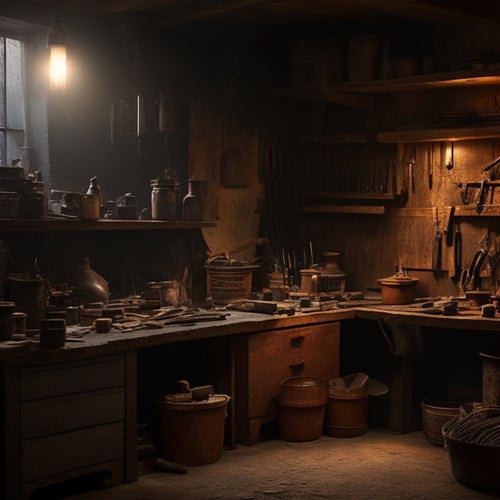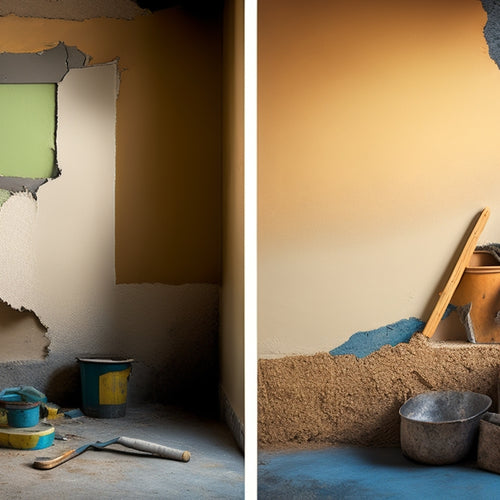
Top Brands for Home Renovation Waterproofing Needs
Share
When it comes to ensuring a watertight home renovation, you need reliable brands and products that can effectively waterproof your space, protecting it from water damage, structural issues, and unhealthy indoor environments. Leading brands like Sika, Dry Treat, and Thoroseal offer a range of products for various masonry applications, focusing on durability, water resistance, and ease of application. From silicone to polyurethane sealants, each type has its strengths, and understanding key factors like functionality, substrate compatibility, and environmental conditions is essential for selecting the right one. Now, explore how to make an informed decision that suits your specific renovation needs.
Key Takeaways
• Sika, Dry Treat, and Thoroseal are leading brands for masonry and waterproofing, offering durable products with long-lasting protection.
• Silicone, polyurethane, epoxy, acrylic, and SMP sealants cater to different applications, considering factors like functionality, substrate compatibility, and environmental conditions.
• For effective basement waterproofing, consider a combination of drainage systems, sump pumps, and waterproof coatings to prevent water seepage and flooding.
• Moisture control techniques, such as moisture detection, humidity control, and waterproofing barriers, help prevent water damage and ensure a dry living space.
• When choosing a waterproofing brand, consider product durability, water resistance, and ease of application to ensure a successful home renovation project.
Best Sealant for Cinder Block
When waterproofing a cinder block structure, selecting the right sealant is vital to prevent water infiltration and structural damage. You'll want to take into account a product that can effectively bond with the porous surface of the cinder block. A suitable sealant will guarantee that water doesn't seep into the block's pores, causing erosion and weakening the structure.
For effective cinder block maintenance, it's important to choose a sealant that can withstand the block's alkalinity and won't break down over time. You'll want to look for a product that's specifically designed for masonry applications and has a high level of adhesion to the cinder block surface.
Proper sealant application is also critical. You'll need to clean the surface of the block thoroughly before applying the sealant, confirming that it's free of dirt, oil, and other contaminants. Then, apply the sealant according to the manufacturer's instructions, taking care to cover the entire surface evenly.
Top Brands for Masonry Sealing
You'll find a range of reputable brands on the market that specialize in masonry sealing products, each offering unique benefits and formulations to suit specific project requirements.
When selecting a top masonry brand for your project, it's crucial to take into account factors such as product durability, water resistance, and ease of application.
Here are three top masonry brands that stand out for their high-quality products and masonry sealing benefits:
-
Sika: Known for their extensive range of masonry sealing products, Sika offers solutions for various applications, from restoration to new construction projects.
-
Dry Treat: This brand specializes in advanced, non-toxic, and eco-friendly masonry sealing products that provide long-lasting protection against water and stain damage.
-
Thoroseal: With a focus on delivering high-performance masonry sealing solutions, Thoroseal offers products that guarantee maximum durability and water resistance for your project.
When choosing a top masonry brand, take into account the specific needs of your project, and research the product's features, benefits, and application instructions to guarantee a successful outcome.
Waterproofing Solutions for Basements
When it comes to waterproofing your basement, you're likely looking for effective solutions to prevent water damage and create a dry, comfortable space.
You'll need to take into account various basement waterproofing methods, such as exterior and interior drainage systems, to guarantee that your basement remains dry and secure.
Basement Waterproofing Methods
Basement waterproofing methods involve applying a combination of technologies and materials to prevent water infiltration, ensuring a dry and habitable space. As you plan your basement renovation, you'll need to evaluate the best approach to keep water out.
You have several options to choose from, including:
-
Drainage Systems: These redirect water away from your basement walls and foundation, reducing hydrostatic pressure and the risk of water seepage.
-
Sump Pumps: These devices collect and pump out water that accumulates in your basement, providing an added layer of protection against flooding.
-
Waterproof Coatings: These specialized materials seal cracks and crevices in your walls and floors, preventing water from seeping into your basement.
Seepage Prevention Systems
Seepage prevention systems, designed to prevent water infiltration, play a critical role in maintaining a dry and habitable basement space by controlling hydrostatic pressure and redirecting water away from your foundation.
As a homeowner, you need a reliable system to prevent seepage, which can lead to structural damage, mold growth, and unhealthy indoor air quality. Effective seepage control strategies involve a combination of advanced materials and innovative drainage system designs.
You should look for systems that incorporate waterproof membranes, drainage channels, and sump pumps to guarantee efficient water management. Additionally, consider systems with advanced features such as sensor-activated pumps and remote monitoring capabilities to provide real-time alerts and peace of mind.
By investing in a high-quality seepage prevention system, you can rest assured that your basement will remain dry, comfortable, and safe for years to come.
Top brands in the industry offer a range of solutions tailored to your specific needs, so it's crucial to research and compare products to find the best fit for your home.
Moisture Control Techniques
Regularly, homeowners overlook the importance of implementing moisture control techniques, which are vital for maintaining a dry and healthy basement environment. You must prioritize these measures to prevent water damage, mold growth, and structural issues. By controlling moisture, you can create a comfortable and safe space for living, storage, or entertainment.
To achieve effective moisture control, consider the following techniques:
-
Moisture Detection: Install sensors to monitor humidity levels and detect early signs of moisture intrusion. This allows you to respond promptly to potential issues.
-
Humidity Control: Implement a dehumidification system to regulate the air's moisture content. This is particularly essential in basements with high humidity levels.
-
Waterproofing Barriers: Apply waterproofing membranes or coatings to prevent water seepage through walls, floors, and ceilings.
Sealant Durability Comparison Chart
You can compare the durability of popular sealant brands using the following chart, which outlines their resistance to water, UV, and chemicals, as well as their expected lifespan and adhesion strength. This chart provides a thorough overview of the top brands, allowing you to make an informed decision for your home renovation project.
In terms of sealant lifespan, some brands offer a longer duration than others. For instance, silicone-based sealants can last up to 20 years, while polyurethane-based sealants may only last around 10 years.
You should also take into account the environmental impact of your chosen sealant, as some brands have a higher VOC (volatile organic compound) content than others.
When evaluating the chart, pay attention to the adhesion strength, as this will affect the sealant's ability to bond with various surfaces. You'll also want to take into account the specific needs of your project, such as resistance to extreme temperatures or chemicals.
Epoxy Vs Polyurethane Sealants
When choosing between epoxy and polyurethane sealants, your project's specific requirements, such as exposure to chemicals or extreme temperatures, will dictate which type is best suited for the job.
Epoxy sealants offer several advantages, including high bonding strength, excellent chemical resistance, and a long-lasting, durable finish. On the other hand, polyurethane sealants provide flexibility, making them ideal for joints and areas subject to movement or vibration.
Here are three key differences to evaluate:
-
Chemical Resistance: Epoxy sealants excel in harsh environments, while polyurethane sealants are more susceptible to chemical damage.
-
Flexibility: Polyurethane sealants offer greater flexibility, making them suitable for dynamic joints, whereas epoxy sealants are more rigid.
-
Curing Time: Epoxy sealants typically require a longer curing time, while polyurethane sealants cure faster, allowing for quicker project completion.
Ultimately, understanding the unique characteristics of each sealant type will enable you to make an informed decision, ensuring your waterproofing project meets its specific requirements and lasts for years to come.
Waterproof Coatings for Walls
When it comes to waterproof coatings for walls, you'll need to contemplate the best wall protection options for your home renovation project.
You'll want to identify effective moisture barriers that can prevent water from seeping into your walls and causing damage.
Wall Protection Options
Several waterproof coating options are available for walls, each offering a unique set of benefits and protection levels against water ingress and damage. As you consider the best option for your home renovation, it's crucial to understand the characteristics of each type of coating.
Here are three popular waterproof coating options for walls:
-
Acrylic coatings: These water-based coatings are easy to apply and offer excellent adhesion to various wall materials, including concrete, masonry, and drywall. They provide a breathable barrier that allows moisture to escape while preventing water ingress.
-
Polyurethane coatings: Known for their high durability and flexibility, polyurethane coatings are ideal for walls exposed to harsh weather conditions or high-traffic areas. They offer excellent resistance to abrasion and chemicals.
-
Silicone coatings: These coatings provide a high level of flexibility and can accommodate movement and expansion in walls. They're suitable for walls with cracks or joints and offer excellent UV resistance.
When selecting a waterproof coating, consider factors such as the type of wall material, the level of protection required, and the desired appearance. By choosing the right coating, you can guarantee your walls remain protected and secure for years to come.
Effective Moisture Barriers
You can guarantee a watertight seal by applying effective moisture barriers, which are specifically designed to prevent water ingress and damage to your walls. These barriers play an important role in moisture management, ensuring that water doesn't seep into your walls and cause structural damage or mold growth.
When selecting a moisture barrier, it's vital to take into account the barrier effectiveness, considering factors such as permeability, adhesion, and durability. A high-quality moisture barrier should be able to withstand harsh weather conditions, including heavy rainfall and extreme temperatures.
Look for products that have undergone rigorous testing and have met industry standards for waterproofing. Additionally, evaluate the type of wall material you're working with, as some barriers may be more suitable for certain surfaces than others.
Choosing the Right Sealant Type
Choosing the Right Sealant Type
Five key factors - functionality, substrate, environmental conditions, durability, and aesthetics - must be taken into account when selecting the right sealant type for your home renovation project.
You need to determine the specific requirements of your project to guarantee the sealant you choose can meet those needs.
Here are three essential aspects to take into account when evaluating sealant types:
-
Chemical Resistance: Will the sealant be exposed to harsh chemicals, such as cleaning products or solvents, that could compromise its integrity?
-
Adhesion: How well will the sealant bond to the substrate, and will it maintain its adhesion over time?
-
UV Stability: Will the sealant be exposed to direct sunlight, and if so, how will it hold up to UV radiation?
Different sealant types, such as silicone, polyurethane, or hybrid sealants, offer unique benefits and drawbacks.
Understanding the application techniques and characteristics of each sealant type is vital to making an informed decision.
Sealant Application and Tools
Applying sealants correctly is crucial to achieving a watertight seal, and mastering the techniques and tools required for successful application is essential to guaranteeing the longevity of your home renovation project.
You'll want to develop a solid understanding of sealant application techniques, including surface preparation, bead size and shape, and tool selection. For instance, you'll need to ascertain the surface is clean, dry, and free of contaminants before applying the sealant. Additionally, you'll need to choose the right tool for the job, such as a caulk gun or a sealant applicator.
Investing in fundamental waterproofing tools will also make a significant difference in the quality of your sealant application. A good quality caulk gun, for example, will provide a consistent flow of sealant, guaranteeing a smooth and even application.
Similarly, a sealant cutter or scraper will help you remove excess sealant and achieve a clean finish. By mastering these techniques and investing in the right tools, you'll be able to achieve a professional-looking finish and guarantee your home renovation project stands the test of time.
Budget-Friendly Sealant Options
Concrete sealant options for home renovation projects often come with hefty price tags, but budget-friendly alternatives are available that won't compromise on performance. You don't have to break the bank to achieve affordable waterproofing for your home renovation project.
Here are three budget-friendly sealant options to evaluate for your DIY sealant applications:
-
Acrylic sealers: These water-based sealers are easy to apply and offer excellent durability. They're ideal for interior and exterior applications, including driveways, sidewalks, and pool decks.
-
Polyurethane sealers: These sealers provide a clear, non-yellowing finish and are suitable for both concrete and masonry surfaces. They're resistant to UV rays and offer excellent waterproofing properties.
-
Silane-modified polyether (SMP) sealers: These hybrid sealers combine the benefits of silane and polyether technologies, offering superior waterproofing and durability. They're ideal for applications where high performance is required.
Frequently Asked Questions
Can I Apply Sealant Over Existing Paint or Coatings?
When you're considering applying a sealant over existing paint or coatings, you'll need to assess the surface preparation first.
Not all sealant types are compatible with every coating, so it's essential to choose the right one.
Make certain the surface is clean, dry, and free of contaminants.
If the existing coating is peeling or flaking, you'll need to remove it before applying the new sealant.
Always follow the manufacturer's instructions for surface preparation and compatibility to guarantee a strong bond.
How Long Does It Take for Sealant to Fully Dry and Cure?
You'll be surprised to know that over 80% of homeowners underestimate the importance of proper sealant drying and curing.
When it comes to the curing process, you'll want to wait at least 24 hours for the sealant to fully dry and cure. This timeframe can vary depending on environmental factors like temperature and humidity.
Be patient, as rushing the process can compromise the sealant's effectiveness.
Follow the manufacturer's instructions for best results, and you'll be enjoying a waterproofed home in no time.
Are All Waterproofing Sealants Resistant to Mold and Mildew?
You're wondering if all waterproofing sealants can resist mold and mildew. The answer is no, not all sealants are created equal.
While many claim to be mold- and mildew-resistant, some may only provide temporary protection.
Look for sealants with proven mold resistance and mildew prevention capabilities, typically indicated by certifications like ASTM D3273 or MIL-PRF-85285.
Choose a sealant that meets these standards to guarantee long-term protection for your home renovation project.
Can I Use the Same Sealant for Both Interior and Exterior Surfaces?
You're wondering if you can use the same sealant for both interior and exterior surfaces.
Generally, it's not recommended. Interior sealants are formulated for specific conditions, like low humidity and controlled temperatures, whereas exterior sealants are designed to withstand harsh weather conditions, UV exposure, and extreme temperatures.
Using an interior sealant outside may compromise its performance, and vice versa.
You'll get the best results by choosing a sealant specifically designed for the surface you're working with.
Do Waterproofing Sealants Come With a Manufacturer's Warranty?
As you navigate the complex world of waterproofing, a safety net can be a comforting thought.
Fortunately, most waterproofing sealants come with a manufacturer's warranty, giving you peace of mind.
When selecting a sealant, look for warranty coverage that aligns with the product's expected sealant longevity.
Typically, warranties range from 5 to 20 years, depending on the product and manufacturer.
Be sure to review the warranty terms to guarantee you're protected in case of any issues.
Conclusion
You've made it to the end of our thorough guide to top brands for home renovation waterproofing needs!
With the right sealant, you can protect your home from water damage and guarantee a safe, dry living space.
Did you know that water damage is the second most common reason for homeowner's insurance claims, with an average cost of $4,000 per claim?
By investing in a quality sealant, you can avoid becoming one of these statistics.
Related Posts
-

Why Invest in Quality Plastering Tools for Renovation
When renovating, investing in quality plastering tools is essential for achieving professional-looking results and mi...
-

Why Delay Your Renovation With Poor Tool Management
You're likely unaware that poor tool management is a leading cause of renovation delays, and it's not just about havi...
-

Top 3 Tools to Buy for Stucco Renovation
You'll need the right tools to guarantee a successful stucco renovation, and it all starts with three essential items...


